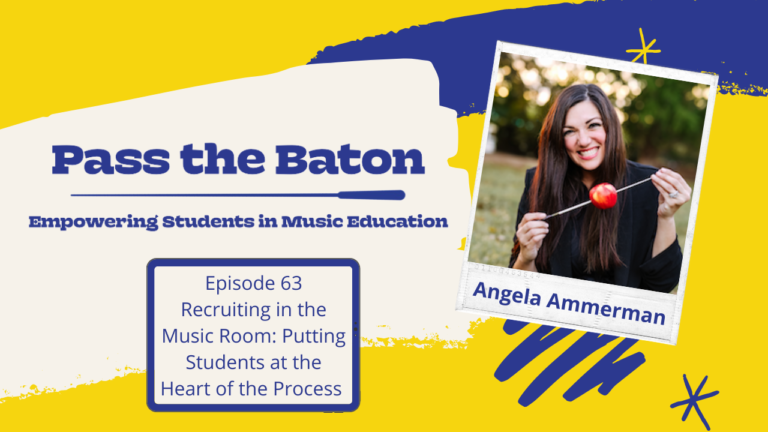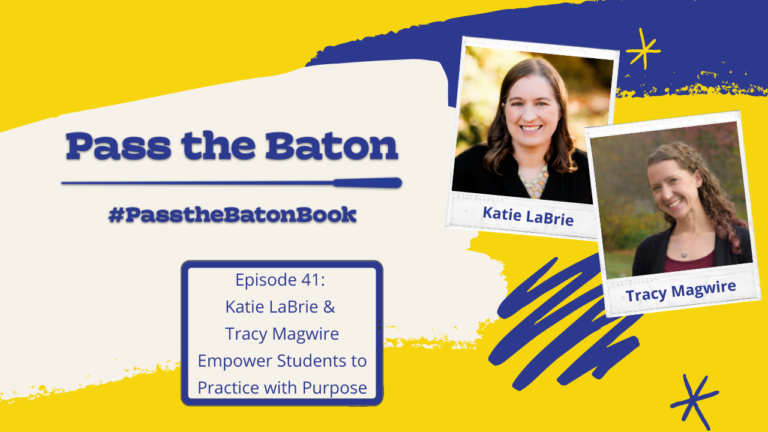In Episode 36, Kathryn and Theresa talk to Heather Fortune, a music educator in Philadelphia, PA. Heather is a professional flutist, with both a bachelor’s and master’s degree in flute performance from Boston University. She was a freelance musician for 10-years in the Philadelphia area before becoming a flute teacher at a Quaker school in the city. After 4 years of teaching private lessons at the school, Heather was hired as the full time instrumental music teacher. Since that time, Heather has worked with the students to create a program that is musically satisfying and empowering for everyone involved.

Where it Started
When Heather started as the instrumental music teacher, she had a small group of students with non-traditional instrumentation. As a result, standard repertoire was not an option. However, with students who were excited to be there, several of which were multi-instrumentalists, Heather discovered she could arrange music the students were interested in. While arranging brought upon its own challenges, she found it fun and rewarding. And the sense of agency she felt as an educator was a surprising benefit!
In the performing world, classical freelancing for example…you have all this expertise, all this craft, all this mastery, but claiming agency in that job is quite tricky. You don’t always have agency. And here I found myself in the classroom, really working with agency.
Heather shares so many great ideas for music educators looking to incorporate more student agency, and find agency themselves as educators.
- Heather arranges music in a way that showcases each student’s gifts and interests and also encourages students to make suggestions about how parts could work even better.
- She recognizes her capacity to keep learning and finds that her music performance degrees help with that.
- The class structure at her school gives students the opportunity to participate in both large and small ensembles. This model encourages students to try new things and learn additional instruments, and as a result, enhances their musicianship.
- Technology has played a big role in Heather’s teaching. She has found that giving students access to XML scores (music notation) through Flat.io has served as a great practice tool since students can solo their parts, play along with the full score, and things like that. There are even creative opportunities students can take advantage of, having these scores.
- Other tools Heather uses (and loves) include Sight Reading Factory and Flipgrid.
- Heather shares how maintaining a good relationship with the school athletic director has helped the music program, as has the incorporation of ensemble t-shirts!
Benefits to the Students
The biggest benefit Heather has noticed is that her students understand how to be “fearless, not flawless.” They understand mistakes are part of the process and it’s okay to make a mistake. She is also working to develop students who will continue making music after high school – playing in bands with friends, going to concerts – because it’s meaningful to them.
Fearless not flawless. They learn that mistakes are part of the process, and sometimes they happen, but we try not to make them, but it’s okay. Music belongs to you. You get this for the rest of your life.
What Can You Try Tomorrow?
Heather first suggests ensemble directors let students choose where they sit. Even if it’s only for part of one rehearsal. Give students that opportunity to experience music making from a different place. Heather also encourages ensemble directors to try arranging for their students. Ask students what they want to learn and what music they want to play. Then take time to reflect, both during the learning process and after.
Be sure to check out the full interview on YouTube or your favorite podcast platform: How Student Agency Can Transform an Ensemble

Connect with Heather and learn more about her work:
- Notes By Heather
- Instagram: @NotesByHeather
- Breaking Band: Legacy Ensembles Transformed
- Musescore Arrangements
Listen to the full interview on your favorite podcast app or here, on Anchor!
Looking for more ways to give students agency in ensembles? Check out these interviews:
- Student Ownership Through Active Thinking, with Dr. Brian Weidner
- The Power of a Mission Statement, with Kevin Feher
- Creating a Student Centered Choral Program, with Brian Ackles



